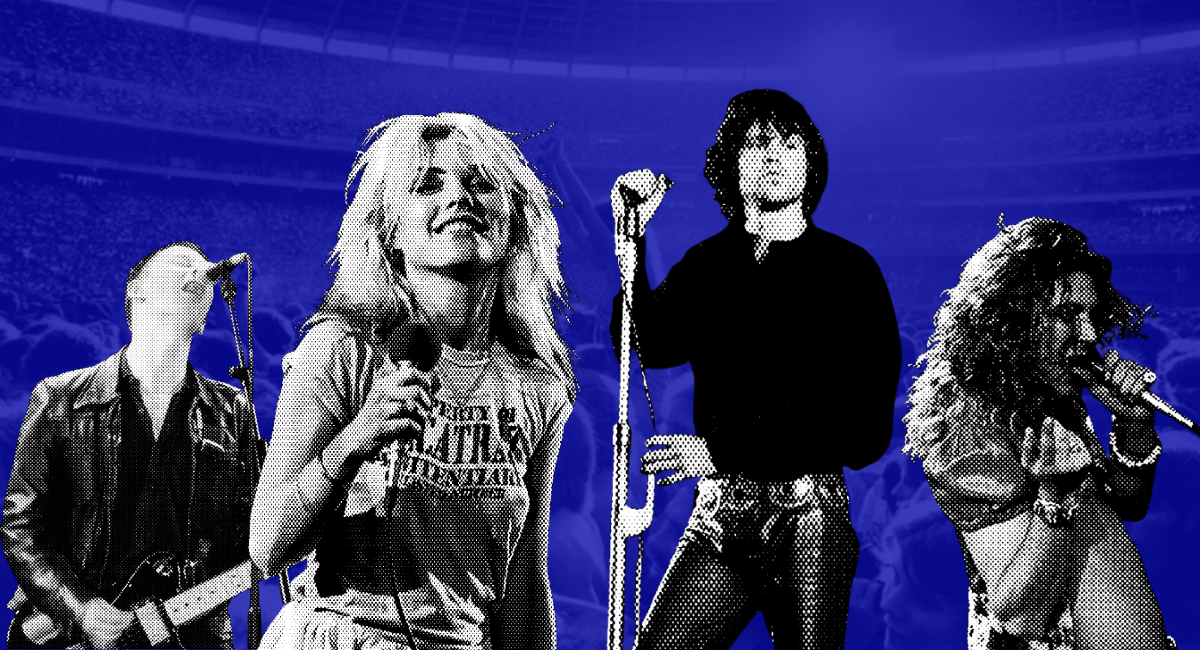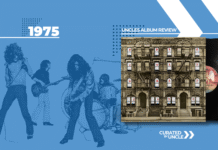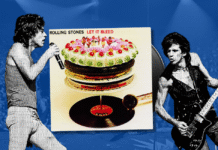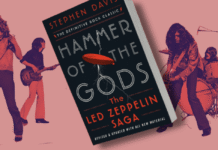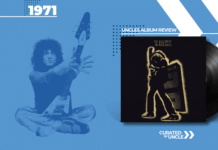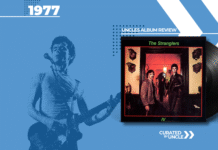The 20 Greatest Frontmen (and women) of All Time: A Celebration of Chaos, Charisma and Carefully Orchestrated Madness
There are singers. And then there are frontmen. And one frontwoman. The gods and goddesses of the stage who don’t just sing the songs, they are the songs. This isn’t a polite nod to technical vocal ability or best-selling records. It’s a raucous, beer-soaked tribute to the most iconic, charismatic and unforgettable frontpeople in music history.
Whether it’s the operatic theatrics of Freddie Mercury, the nihilistic sneer of Johnny Rotten, or the shamanic weirdness of Jim Morrison, these performers didn’t just front bands, they led cults, commanded armies and occasionally caused mild international incidents. Great frontpeople are part rock star, part preacher,and part health hazard. And when they walk on stage, it’s like watching lightning punch itself in the face.
You’ll find legends from classic rock, punk, grunge, glam and even a bit of pop on this list, because commanding a stage transcends genre. Some entries will be expected: Mick Jagger, Kurt Cobain, Iggy Pop and some might make you tilt your head and say, “Really?” But that’s the point. The best frontpeople aren’t just about the music. They’re about presence. Attitude. That intangible, ridiculous quality that makes an entire arena scream back a chorus like it’s a battle cry.
And no, they don’t always have flawless vocal cords. Some can barely hold a note without sounding like a bin being thrown down the stairs. But what they do have is that rare, alchemical combination of arrogance, vulnerability and batshit charisma that makes you want to sell your house and follow them on tour until you forget your own postcode.
I remember seeing old footage of some of these lunatics as a teenager and thinking, “You’re allowed to behave like that?” It was equal parts terrifying and liberating. Whether you grew up with them or discovered them on YouTube rabbit holes at 2am, these frontpeople rewired what it means to be a performer. They weren’t just in bands. They were the bands.
So yes, this is subjective. And no, Chad Kroeger didn’t make it. But if you’re here to bask in nostalgia, sneer at the overrated, or just argue loudly in the comments, welcome. This list of the 20 greatest frontmen and women in music history is made with love, loathing and enough stage sweat to drown a roadie.
Let’s begin.
20. Liam Gallagher (Oasis)
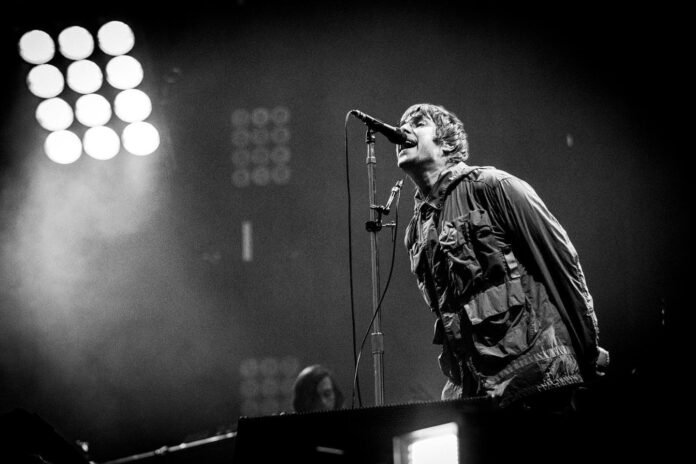
The Swaggering Gob Almighty of Britpop
Liam Gallagher didn’t walk onto stages, he marched. Chin up, arms behind back, like a man inspecting a particularly disappointing queue. His whole vibe screamed, “I’m not here to perform. I’m here to remind you that I’m the best thing that’s ever happened to microphones.” And, somehow, he wasn’t wrong.
As the voice of Oasis, Liam didn’t just front a band, he declared war on subtlety. His posture alone became iconic: static, stoic, leaning into the mic like it owed him money. No dancing. No theatrics. Just pure Mancunian menace wrapped in a parka. And yet he radiated charisma, like a bloke who got into a fight with God in a pub car park and won on points.
There’s something magnetic about a frontman who seems to actively despise the idea of performing. Liam’s sneering delivery, nasal bravado and weaponised unbotheredness turned every live show into a showdown. You weren’t there for harmonies. You were there for a northern sermon, barked by a man who looked like he’d rather be chain-smoking outside a kebab shop.
And then there’s the voice, that unmistakable rasp, all sneer and snarl, like someone sandpapering a Beatles record. It shouldn’t work. But when he belts out “Live Forever” or “Supersonic”, it hits like gospel for disaffected teenagers and nostalgic middle-aged men alike.
Liam Gallagher is proof that attitude is an instrument. He didn’t want to entertain you. He wanted to conquer you. And for a while in the ’90s, he absolutely did, lager in hand, collar up and middle finger permanently poised.
19. Johnny Rotten (Sex Pistols)
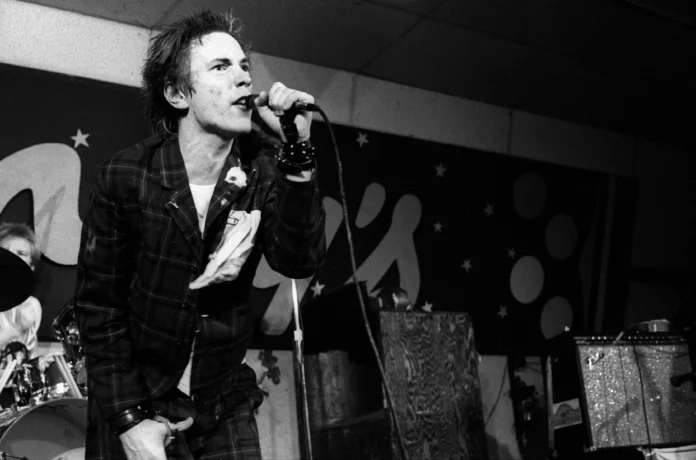
The Sneering Anarchist Who Invented Punk’s Middle Finger
Johnny Rotten didn’t just storm the stage, he invaded it with all the grace of a Molotov cocktail tossed through a window. As the snarling frontman of the Sex Pistols, he was punk personified: raw, ugly, confrontational and utterly impossible to ignore. If you weren’t outraged by him, you were probably dead.
I remember the first time I heard “Anarchy in the UK” it sounded like someone had taken a sledgehammer to music itself and shouted “Sod your rules!” over the rubble. Rotten’s voice was a corrosive sneer, half-scream, half-spit, packed with a venom that made the establishment’s hackles rise faster than you could say “God Save the Queen.” He wasn’t interested in being liked. He wanted to provoke, scandalise and shatter the complacency of late ’70s Britain.
On stage, Johnny was a whirlwind of chaos and disdain, a living embodiment of teenage fury and nihilism. His gyrations were less about dance and more about sheer defiance, a middle finger held high for anyone expecting traditional rock-star charisma. Every sneer, every snarled lyric was a direct challenge to the status quo, a “screw you” to the music industry, the monarchy and polite society alike.
But beyond the snarls and spiked hair was a complex figure. Rotten was as much a performance artist as a punk singer, crafting a persona that was both repellant and magnetic. His wit was as sharp as his sneer and his lyrics cut deeper than the snarls suggested. There was an intelligence wrapped in chaos, a method in the madness.
Johnny Rotten wasn’t just a frontman. He was an explosion, short-lived but seismic. His brief, incendiary career with the Sex Pistols changed music forever, tearing down the bloated stadium rock of the ’70s and paving the way for every punk, grunge and alternative act that followed. He showed us that sometimes, the loudest voice isn’t the prettiest but it’s the one you can’t ignore.
So here’s to Johnny Rotten: the original punk prophet, the sneering anarchist who made rebellion sound like a scream in the void and whose legacy still ruffles feathers decades later.
18. Thom Yorke (Radiohead)
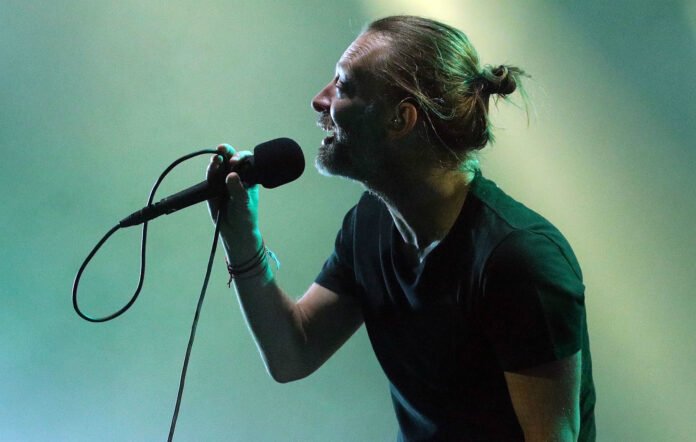
The Reluctant Prophet of Paranoia and Bleak Beauty
Thom Yorke never wanted to be a frontman. He always looked slightly annoyed to be on stage, like someone had tricked him into coming out for a pint and accidentally booked him to headline Glastonbury. And yet, somehow, this twitchy, mumbling prophet of existential despair became one of the most compelling live performers of the last three decades.
Watching Thom Yorke on stage is like watching a man argue with invisible demons while being electrocuted in time with the bassline. He jerks, he spasms, he contorts his body like he’s being punished for feeling too much – which, given the themes of most Radiohead songs, might not be far off. He doesn’t so much sing as exorcise. His falsetto isn’t pretty; it’s raw, alien, fragile. Like a warning from a dying satellite.
There’s zero showboating. No flashy lights. No pandering. Just a man and his band, crafting soundscapes that feel like they were beamed in from a future where robots have developed anxiety. And yet, thousands stand in hushed reverence, completely transfixed. Because when Thom Yorke opens his mouth, he somehow articulates every quiet dread you’ve ever tried to ignore. The crushing weight of modernity. The emptiness of consumer culture. The horror of small talk. It’s all there, wrapped in melody and static.
And then there’s the dancing. Jesus Christ, the dancing. He moves like a malfunctioning interpretive dancer possessed by the ghost of every broken modem from the ‘90s. But it works. It shouldn’t, but it does. Because in a world of posturing and polish, Thom Yorke is unfiltered signal. Pure expression. No middleman.
He doesn’t want to be your messiah. He just wants to play the next song and vanish into the ether. But somehow, in his reluctance, he became the voice of a generation that didn’t know how to scream only how to quietly collapse. And honestly? That’s frontmanship at its most devastating.
17. Jack White (The White Stripes)
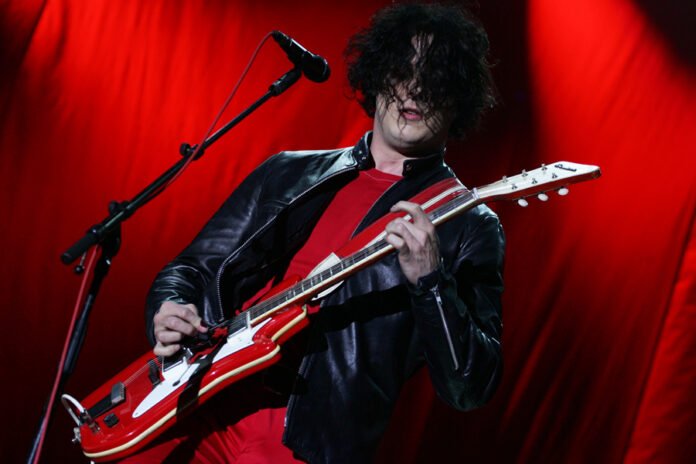
The Gothic Blues Howler with a God Complex and a Guitar
Jack White didn’t so much front The White Stripes as summon them into existence through sheer force of gothic will. Looking like a turn-of-the-century undertaker who accidentally wandered into a Delta blues bar, he played every show like he was trying to exorcise Robert Johnson’s ghost using only a distorted octave pedal and unprocessed trauma.
You could never really tell if Jack White was possessed by the spirit of rock ’n’ roll or if he genuinely believed he was rock ’n’ roll reincarnate. Either way, it worked. With a two-piece band and a three-colour palette – red, white and black, like the world’s most stylish migraine, he managed to sound bigger, weirder and louder than bands triple the size with half the taste.
Live, Jack wasn’t just a performer, he was a conductor of chaos. Sweating buckets, wrenching sounds out of his guitar like it owed him money, bellowing like a Southern preacher who’d just found out his wife left him for a synthesiser. He strutted, stomped and snarled, but always with purpose, a man absolutely convinced that every downstroke mattered. And when he wailed, it wasn’t showboating. It was urgency. Like the song was clawing its way out of his throat before it set fire to his insides.
And then there was the mystique, the faux-sibling relationship with Meg, the old-school vinyl evangelism, the refusal to use a setlist like he was duelling fate itself. Jack White didn’t care if you liked him. He cared if you believed him. And for those brief, blistering moments on stage, you always did.
He wasn’t interested in being your mate. He wanted to drag you kicking and screaming into the altar of distortion, baptise you in reverb and leave you wondering what century you’d just visited. Jack White is proof that you don’t need pyrotechnics when your guitar solos already sound like a building collapsing in a minor key.
16. Roger Daltrey (The Who)
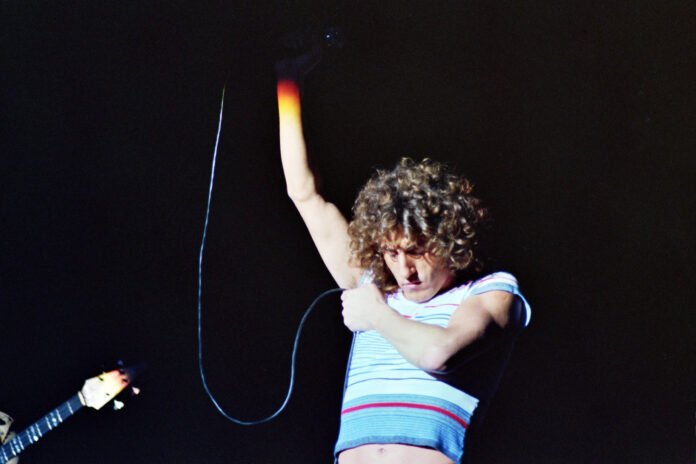
The Mic-Swinging Lion of British Rock
Roger Daltrey didn’t so much front The Who as bare-knuckle brawl his way to the front of it. While Townshend windmilled and Keith Moon detonated behind the kit like a caffeinated raccoon with access to high explosives, Daltrey was the eye of the storm, shirt ripped, hair flying, voice blasting like a foghorn through a wind tunnel. He was the archetype of the “rock god” before that term got ruined by anyone wearing leather trousers from Zara.
What made Daltrey a truly legendary frontman wasn’t just the voice – though Christ, that voice. Raw. Thunderous. The sound of a pissed-off thundercloud with unresolved father issues. It was the presence. He had the physicality of someone who looked like he could both sing you into a euphoric trance and punch out your landlord in the same breath. And the mic swinging? Not a gimmick. A weaponised extension of his rage and rhythm. Like a cowboy had wandered into a rock opera and decided the lasso could multitask.
I remember seeing old clips of The Who’s Live at Leeds and being genuinely afraid for the microphone. It looked like it owed Daltrey money. That cable had seen things. But then you’d get to the bit in “Won’t Get Fooled Again” that howl. That lung-shredding, soul-purging, god-has-entered-the-chat scream. It’s not just one of the greatest vocal moments in rock history, it’s a primal release that could kickstart a defibrillator.
Daltrey brought a physical intensity that predated the era of gym-honed frontmen. He wasn’t chiseled, he was carved. Like someone had whittled a Greek statue out of pure British fury. And onstage, he had an almost gladiatorial energy, not posing, but fighting the songs into existence. No backup dancers. No elaborate stagecraft. Just grit, growl and that mic cord threatening a nearby roadie.
But what really cements Daltrey’s greatness is his ability to both inhabit and anchor Pete Townshend’s sprawling rock operas. Tommy, Quadrophenia these were labyrinths of character and concept. Daltrey gave them weight, blood, urgency. He wasn’t just singing lyrics, he was translating Townshend’s fever dreams into something you could feel in your chest cavity.
And somehow, amid the sonic carnage, he maintained this weird, simmering control. He commanded. Not in the Freddie Mercury, crown-and-cape sense – but in the “dad-who’s-had-enough-of-your-shit” sense. Unapologetic. Unrelenting. Unfakeable.
Roger Daltrey didn’t just define what a frontman could be, he threatened the role into evolving. He turned every stage into a battlefield and every note into an act of rebellion. In a band full of madmen and musical anarchists, he stood tall as the voice, the fury and occasionally, the one who’d slap some sense into the rest of them.
15. Bruce Springsteen (E Street Band)
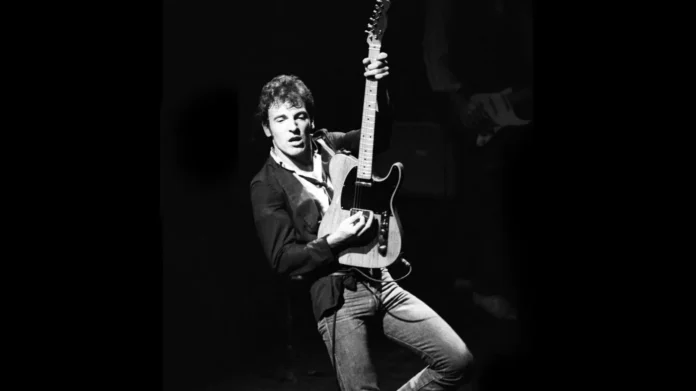
The Everyman Preacher of Rock ‘n’ Roll Redemption
Bruce Springsteen didn’t just front a band, he fronted an entire worldview. Part street poet, part revivalist preacher, part denim-clad motivational speaker, The Boss came armed with a Fender Telecaster and a compulsion to turn every gig into a working-class epic. Watching him live felt like attending a blue-collar TED Talk powered by sweat, saxophones and soul.
I remember seeing footage of Springsteen in the ’80s, drenched in sweat by the third song, eyes closed, clutching the mic like it owed him back pay. He wasn’t just singing Born to Run, he was testifying. Preaching escape, resilience, love, regret and whatever else you’d scribbled in your notebook after your second beer and third existential crisis.
What made him electric wasn’t flash or flamboyance, it was commitment. Unrelenting, foot-on-the-monitor, three-hours-or-bust commitment. While other frontmen posed and postured, Springsteen made eye contact with the nosebleed seats like he was personally checking in on their wellbeing. The man could shout “One! Two! Three! Four!” with such conviction it felt like a call to arms.
And let’s talk about stamina. Some frontmen burn bright and short. Bruce? Bruce is a coal fire in human form, slow-burning, intensely hot and somehow still going decades later without melting into a pile of American flags and harmonicas. He’s built like a bricklayer, performs like a prophet and still somehow writes lyrics like he’s 23 and heartbroken outside a Jersey diner at 2 a.m.
Bruce Springsteen is the last great frontman who means it. No irony, no posturing, just sweat, soul and songs about getting the hell out of town before life steamrolls you. He’s a rock ‘n’ roll messiah who trades miracles for overtime and guitar solos.
And honestly? That’s exactly what the job demands.
14. Axl Rose (Guns N’ Roses)
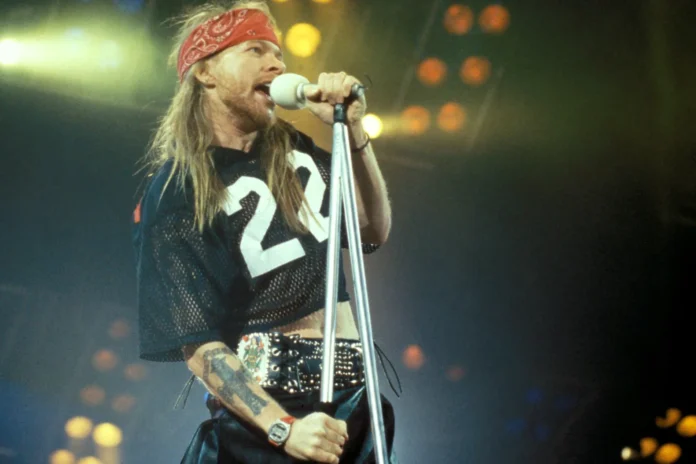
The Feral Showman with a Jet Engine for a Throat
If Freddie Mercury was a ringmaster and Iggy Pop a chaos demon, Axl Rose was something else entirely, a back-alley brawler in spandex, equal parts street punk, glam diva and deranged preacher screaming the gospel of sleaze. He didn’t just command the stage, he claimed it, like a cocky outlaw crashing a banquet and promptly flipping the table.
I remember watching Axl storm across a festival stage Mic in one hand, snake hips in full swing, bandana hanging on for dear life, he was pure id with a microphone. There was no middle ground with Axl. He didn’t “entertain” so much as assault the audience with charisma and volume. You either worshipped him or wished he’d shut up — and that polarising unpredictability made him riveting.
Vocally, the man was a monster. One minute, a velvet snarl that seduced, the next, an upper-register banshee wail that could sandblast concrete. He wasn’t just singing Welcome to the Jungle, he was dragging you through it by the collar, shrieking in your face about serpents, sin and survival.
And then there’s the drama. Oh, the drama. Feuds, riots, walk-offs, absurd rider demands, Axl was rock ‘n’ roll’s resident diva and demolition expert, often simultaneously. But that volatility wasn’t just tabloid fodder, it was part of the appeal. You bought a ticket knowing the band might start two hours late or implode halfway through. But when the stars aligned and Axl was in full flow? You got a livewire spectacle that made you believe in the raw, feral magic of rock.
He was a serpent in aviators, a high-kicking paradox, an ego wrapped in leather. And at the centre of the GNR hurricane, he made chaos look like choreography, just with more profanity.
Axl Rose wasn’t just a frontman. He was a powder keg with a tour pass. The last great glam-anarchist to remind us that sometimes, the most electrifying frontmen are the ones who might not finish the set… and might burn down the venue on the way out.
13. Kurt Cobain (Nirvana)
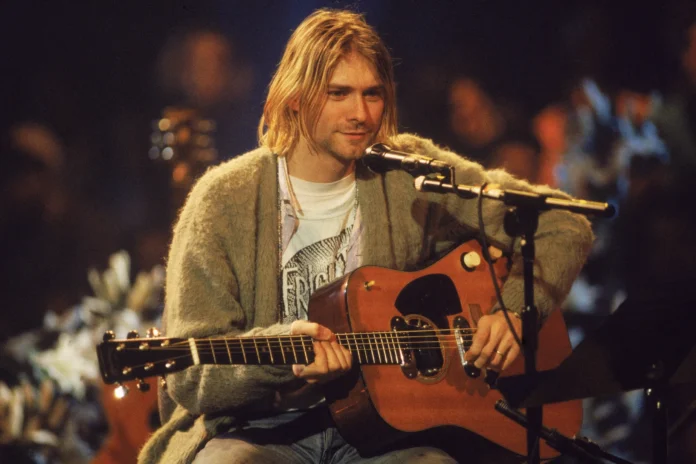
The Reluctant Messiah of Grunge
Kurt Cobain never wanted to be a frontman. Which is precisely why he became one of the most iconic. In a world full of peacocking rock stars swinging microphones like lassos and demanding your adoration, Cobain shuffled onstage in a moth-eaten cardigan, hair like wet straw, muttering apologies before detonating the room with an emotional payload that left your spine humming.
I remember the first time I saw Nirvana on TV, it wasn’t a performance, it was an exorcism. Cobain’s voice wasn’t pitch-perfect, it was shredded, scorched, guttural like a scream filtered through a throat full of broken glass and resentment. And somehow, it was beautiful. Because it was real. There was no rock star sheen, no glitter cannon, no gospel choir emerging from trapdoors. Just a skinny bloke from Aberdeen, Washington, making pain sound poetic and feedback feel like therapy.
He sang like he was trying to outpace a collapse. When Cobain played, it felt like the whole thing might fall apart, the song, the band, the man himself. That sense of imminent implosion was electrifying. You weren’t watching a show. You were witnessing a barely contained emotional avalanche.
And then there was that look: hunched posture, dead-eyed stare, cigarette balanced on his lip like it had nowhere else to be. He wasn’t trying to seduce the crowd. He looked like he wanted to disappear into his own amp stack. And yet, you couldn’t look away.
Cobain’s genius wasn’t just in his songwriting – though Christ, those songs. “Smells Like Teen Spirit” was the Molotov cocktail that set MTV ablaze. “Come as You Are” was the world’s loneliest open invitation. “All Apologies” was an audible shrug drenched in sorrow. He wrote like a man who knew the world was broken and still found melodies hiding in the shards.
Ironically, the guy who hated fame ended up becoming the reluctant poster boy for a generation that didn’t ask for a voice either. And in trying to flee the spotlight, he became a lighthouse for millions who felt just as lost. He didn’t want to lead, but we followed him anyway, because in his unease, his discomfort, his raw vulnerability, we saw ourselves.
Kurt Cobain wasn’t a rock god in the traditional sense. He wasn’t interested in commanding the room, he just didn’t know how to leave it. He mumbled, screamed, shrugged and combusted his way into music history by accident. And in doing so, he changed everything.
Some frontmen wear crowns. Cobain wore a hospital gown on MTV Unplugged, shredded his voice and reminded us that sometimes the most powerful performance is simply being honest. Even when it hurts.
12. Joe Strummer (The Clash)
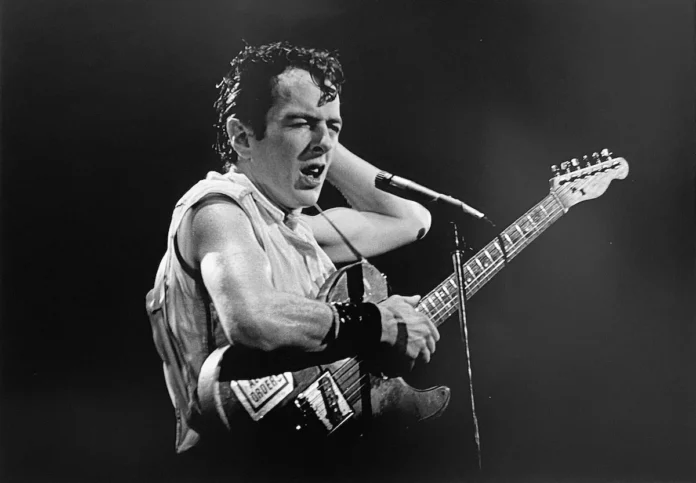
The Righteous Ranter of Punk Rebellion
Joe Strummer didn’t just front a band, he fronted a bloody revolution. With The Clash, he wasn’t trying to be adored, he was trying to wake people the hell up. While other frontmen posed and postured, Strummer was spitting truths like a man with a deadline and a vendetta. He looked like someone who’d missed a few meals and picked a fight with Thatcher on the way to the gig and that was exactly the point.
I remember watching old footage of The Clash tearing through “London Calling,” and Strummer is just there snarling into the mic, guitar slung like a weapon, sweat flying in all directions. He wasn’t singing a song. He was delivering a warning. The stage wasn’t a platform it was a pulpit and Strummer was the punk-rock prophet railing against the apocalypse with a three-chord sermon and a righteous scowl.
He wasn’t the most polished vocalist and he certainly didn’t prance about like Jagger or Mercury. What he had was conviction. Fire. A raw, combustible energy that made you want to punch the air and question authority, sometimes in the same breath. And that gravelly bark of his? It sounded like it’d been forged in protest marches and late-night pub arguments.
But Strummer wasn’t all rage and rebellion. There was heart, too. Beneath the snarls and slogans was a man who genuinely cared about music, about people, about justice. He didn’t use the stage to show off. He used it to connect. And in doing so, he made punk personal.
Joe Strummer was the sound of discontent with a rhythm section. A street poet in a battered leather jacket who made you believe that three chords and the truth could still change the world. And maybe, for a brief, glorious time, it did.
11. Ozzy Osbourne (Black Sabbath)
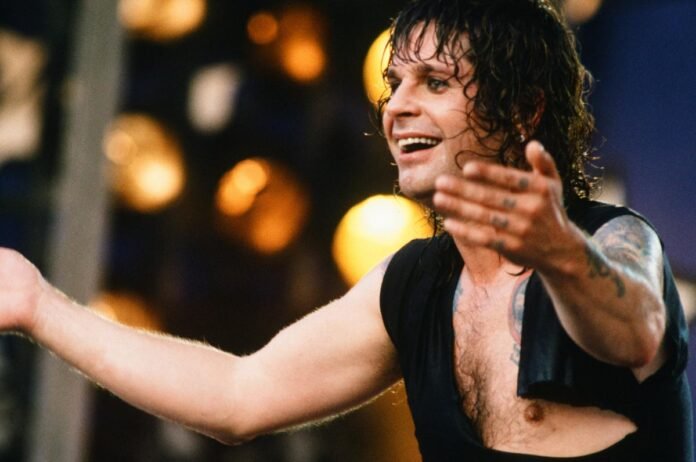
The Prince of F—ing Darkness
Ozzy Osbourne is the kind of frontman who could barely remember his own lyrics, let alone what city he was in and yet, somehow, he turned disarray into dark magic. With a voice like a haunted kettle and stage presence that oscillated between bewildered pensioner and apocalyptic banshee, Ozzy didn’t just front Black Sabbath, he was the human embodiment of heavy metal’s strange, demonic heart.
I remember watching The Osbournes in the early 2000s and thinking, “How did this man become the godfather of metal?” And then I watched a 1970s Sabbath gig. Oh. Right. That Ozzy wide-eyed, cross-wielding and howling through songs like “War Pigs” and “Paranoid” with the conviction of someone who’d just woken up in hell and decided to redecorate. You could see it then: he wasn’t just a frontman. He was a conduit for every Catholic guilt nightmare you’ve ever had after three tabs of acid.
Ozzy didn’t have the polish of Freddie or the poetic touch of Morrissey. What he had was presence. A kind of lurching, otherworldly energy like he was only partially in control of his body but fully in control of the stage. He’d clap along off-beat, mumble incoherently between songs and still manage to make tens of thousands of fans feel like they’d glimpsed Lucifer’s party planner in action.
Let’s not forget the infamous bat-biting incident. Whether it was a publicity stunt, a genuine mistake, or just what passed for dinner on tour, it cemented Ozzy in the pantheon of “what the actual hell” rock moments. The man turned a zoonotic horror story into branding.
Off stage, he’s a walking PSA about what happens when you replace your blood with Jack Daniel’s and Valium. On stage, he’s unstoppable the sort of figure who could raise his arms like some zombie conductor and have 80,000 metalheads screaming like they’ve all simultaneously stubbed their toes on the edge of the abyss.
Ozzy Osbourne redefined what it meant to be a frontman. Not by being graceful, or eloquent, or even vaguely coherent but by being Ozzy. Somehow fragile and terrifying all at once. A black-clad relic of the underworld who made darkness singable and madness marketable.
You didn’t come to a Black Sabbath show to witness musical precision. You came to be anointed in distortion and shouted at by a man who once tried to have a conversation with a shrub. And honestly? You’d do it again.
10. Patti Smith
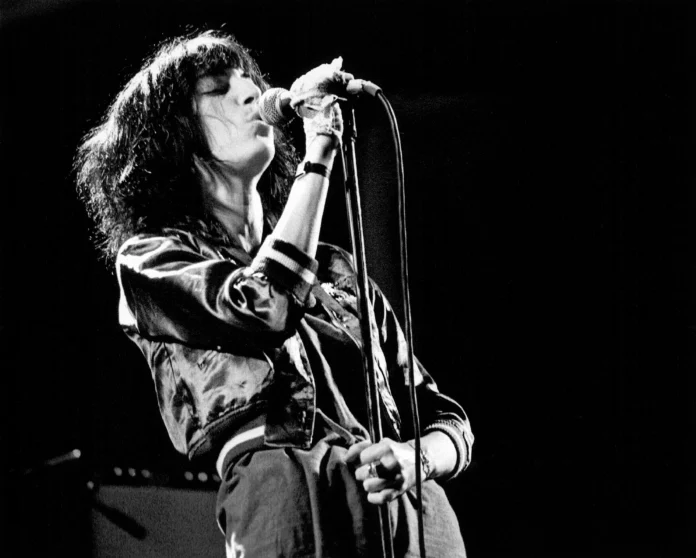
The Punk Priestess Who Turned Poetry into Fire
Patti Smith didn’t perform rock music, she channelled it like some sweat-drenched oracle mid-seance. If Bob Dylan and Rimbaud had a lovechild who grew up chain-smoking in CBGB’s bathroom, it’d probably look a lot like Patti. She was punk’s high priestess, equal parts literary lioness and feral banshee, belting out raw truths like she was summoning ancient spirits via distortion pedal.
I remember the first time I heard Horses. That opening line “Jesus died for somebody’s sins but not mine” hit like a declaration of war. And then she just goes, spiralling into a poetic frenzy that feels more like a possession than a performance. Patti didn’t care if you were comfortable. In fact, she probably hoped you weren’t.
On stage, she was confrontational, magnetic and gloriously unpolished. She’d sway, scream, spit and recite poetry like she was dragging the beatniks kicking and screaming into the punk era. While the boys in leather jackets were thrashing and posturing, Patti was prophesying. She made intellect sexy and rebellion sound like scripture.
Her influence is everywhere in punk, in indie, in riot grrrl, in any woman who’s ever picked up a mic and thought, “Yeah, I’ve got something to scream about too.” Patti Smith didn’t just front a band, she fronted a revolution. And she did it in a battered shirt, with a guitar slung like a weapon and a sneer that said, “Come on, then.”
She didn’t bend to the rock star mould. She smashed it and built an altar from the shards.
9. James Brown
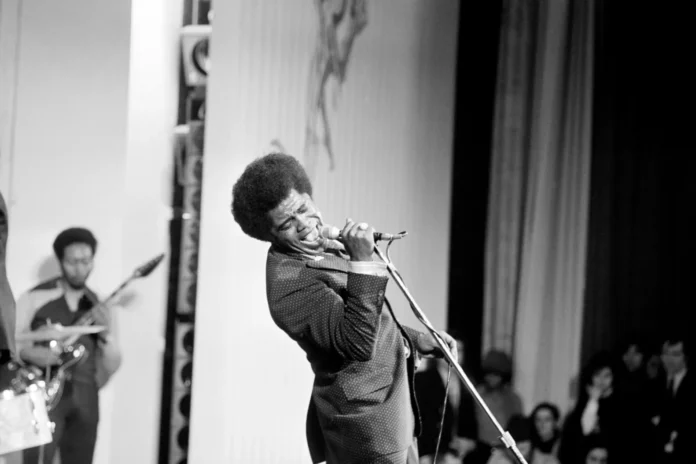
The Godfather of Soul and the Original Stage Dynamo
James Brown was a force of nature, a kinetic hurricane wrapped in a tuxedo and the original blueprint for what it meant to own a stage. Long before anyone started obsessing over stage presence, Brown perfected it, the man could make a single glance feel like a lightning bolt, a sideways nod a thunderclap and a full-body shimmy an earthquake. He was the undisputed king of performance energy, a man whose every move was an electric jolt to the audience’s nervous system.
I remember watching old footage of Brown’s live shows, usually grainy and in black-and-white and still feeling the urge to get up and dance in my living room. It was impossible not to. Even with just the TV’s speaker, the raw power of his voice gravelly yet commanding pulled you in like a tractor beam. When he hit those signature screams or the patented “Good God!” shout, it was like the entire room collectively lost its mind.
James Brown was the original hype man, the first frontman to understand that it wasn’t just the music that mattered, it was the spectacle, the sweat, the showmanship and that unshakable groove. He invented moves that dancers still try to mimic decades later, the splits, the spins, the rapid-fire footwork all executed with a precision and flair that made it look effortless, even though it wasn’t.
What really set Brown apart was his unrelenting discipline. Behind all that raw energy was a man who demanded perfection from himself and his band, The Famous Flames. Every note, every beat, every step had a purpose. When he shouted, “Don’t be a dropout!” it wasn’t just a lyric; it was a command to live fully, to keep pushing, to never settle for less.
But Brown’s influence wasn’t confined to soul and funk. His rhythmic innovations laid the foundation for hip-hop, R&B and even modern pop. Sampling his grooves became a cornerstone of countless hits, cementing his legacy far beyond the stage.
James Brown was a revolutionary. He showed the world that being a frontperson was about more than just singing, it was about owning the moment, commanding attention with a combination of charisma, talent and sheer willpower. He made music a full-body experience, and for that, he remains the Godfather of Soul, the ultimate stage dynamo, and an eternal inspiration to anyone who’s ever dared to take control of the spotlight.
8. Morrissey (The Smiths)
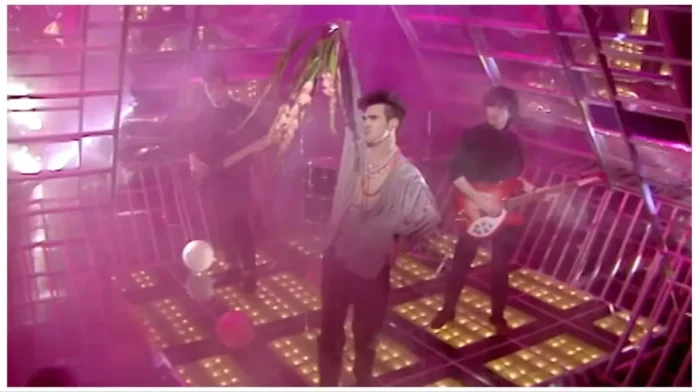
The Melancholy Misfit Who Made Misery Singable
Morrissey wasn’t your typical rock frontman, he was a poet cloaked in sarcasm, a walking paradox of vulnerability and bravado and the voice of a generation that found beauty in bleakness. With The Smiths, he didn’t just sing songs he narrated the quiet, painful, often hilarious anxieties of the outsider. Morrissey made misery stylish and he did it with a wit so sharp it could cut glass.
I remember first hearing “This Charming Man” on a crackly radio, and being struck by how Morrissey’s voice wasn’t about bombast or power, it was about subtlety and sneer. He sounded like he was both laughing at the world and deeply wounded by it, a combination that made you lean in closer, desperate to catch every word dripping with irony and longing.
On stage, Morrissey was a theatrical enigma. His movements were less rockstar swagger and more interpretive dance, the kind you might expect from someone who spent more time reading poetry than throwing shapes in a club. His voice was his weapon and shield, able to soar one moment and whisper the next, all while wearing a quizzical expression that seemed to say, “You’re all idiots, but I’m your idiot.”
But Morrissey’s frontmanship was never about conventional charisma. It was about owning his weirdness, his moodiness and turning it into a communal experience. Watching him was like being invited into a secret club where sadness was celebrated and sarcasm was the currency. He made you feel less alone in your insecurities, less ashamed of your flaws.
And of course, Morrissey’s legacy isn’t without controversy he’s as polarising offstage as he was magnetic on it. But love him or hate him, there’s no denying the impact he had on indie music and beyond. He redefined what it meant to be a frontman: not the loudest or flashiest, but the most uncompromisingly himself.
Morrissey didn’t just lead The Smiths, he gave voice to a generation of misfits and melancholics, proving that sometimes, the most powerful performances come wrapped in vulnerability and a razor-sharp tongue. If you ever needed proof that sadness could be seductive, Morrissey was your man.
7. Debbie Harry (Blondie)
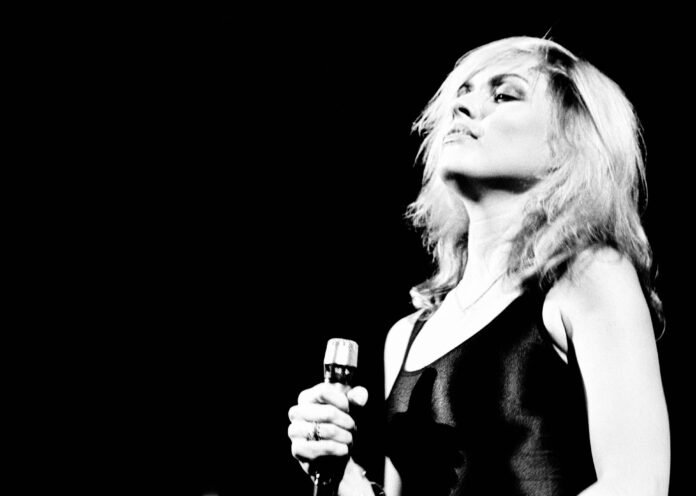
The Punk Pop Siren Who Redefined Cool
Debbie Harry was a seismic shift in how women occupied the rock stage. Blondie exploded onto the late ’70s scene with a mix of punk attitude, pop hooks and a style so effortlessly cool it still makes people stop and stare today. She was the ice queen and the wild child rolled into one, a woman who could sneer with punk venom one moment and croon a disco ballad the next all while looking like she just walked off a fashion runway that doubled as a dive bar.
I remember the first time I heard “Heart of Glass” it was a revelation. Here was this ethereal, slightly distant voice, effortlessly sliding over a beat that somehow fused punk’s rawness with disco’s shimmer. Debbie made genre-hopping look as natural as breathing. You didn’t just listen to Blondie, you wanted to be Debbie Harry.
On stage, Harry was magnetic chaos wrapped in blonde bombshell glam. She had this way of commanding the room without ever seeming like she was trying too hard, which, ironically, made her magnetic power all the more potent. Whether she was prowling the stage like a cat or throwing a cheeky smile to the crowd, she made frontwomanship look like an art form equal parts attitude, style and raw vocal talent.
But beyond the leather and the eyeliner, Debbie Harry was a trailblazer who smashed the glass ceiling of rock stardom, showing that women could be fierce, stylish and unapologetically themselves. Her presence was a rebellious act of cool, an invitation to embrace your contradictions, punk yet pop, tough yet vulnerable, iconic yet human.
Debbie Harry was the heart and soul of a movement that changed the face of music forever. She proved that being a frontperson isn’t just about singing, it’s about owning your identity so completely that you become a beacon for everyone who dares to stand out.
6. Robert Plant (Led Zeppelin)
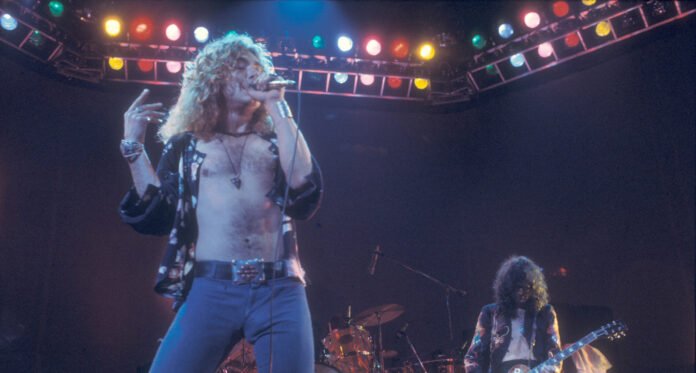
The Mythical Shaman of Rock’s Golden Age
Robert Plant was the primal scream at the heart of Led Zeppelin’s thunderous storm. His voice could shatter glass, summon storms, or seduce with a whisper, often all within the same song. Watching Plant in his prime was like witnessing a pagan ritual disguised as a rock concert, complete with wailing vocals, wild hair and enough swagger to make Mick Jagger blush.
I remember first hearing “Whole Lotta Love” and being utterly unprepared for the sheer force of Plant’s vocal assault. It was like a call from the wild untamed, powerful and unapologetically primal. His stage presence was equally magnetic, he moved with the confidence of a man who knows he’s the centre of the universe but still feels like he’s dancing on the edge of chaos.
Plant had that rare gift of making even the most epic, overblown rock anthem feel intimate. Whether he was howling through “Black Dog” or crooning on “Going to California,” there was always this sense of storytelling, a mythic narrative unfolding with every note. And those signature high-pitched screams? They weren’t just impressive vocal gymnastics, they were a summons to something larger than life.
But Plant’s greatness wasn’t just about the theatrics or the voice. He was a frontman who understood the power of mystery and vulnerability. He could command a stadium of tens of thousands and then disappear into the music, letting Jimmy Page’s guitar do the heavy lifting while he floated like a flame in the dark.
Robert Plant’s legacy is that of the rock shaman a figure who channeled ancient spirits through his voice, conjuring thunder and lightning with every performance. He wasn’t just the face of Led Zeppelin he was the heartbeat, the howl, and the soul of rock’s golden age. And if you were lucky enough to witness it live, you didn’t just see a singer, you experienced a force of nature.
5. Jim Morrison (The Doors)
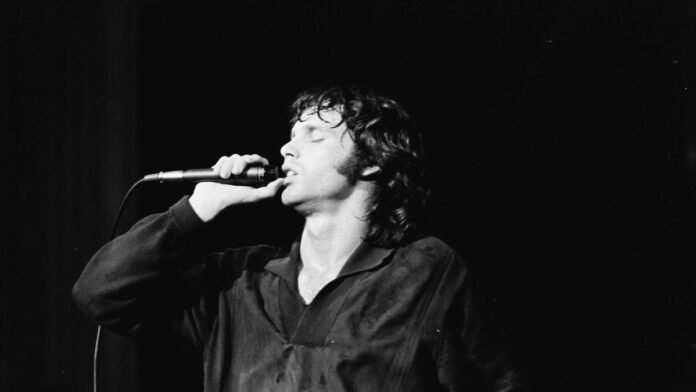
The Poet-Prince of Psychedelic Darkness
Jim Morrison was the embodiment of 1960s rock ‘n’ roll’s darkest, most intoxicating mysteries. The Doors were already pushing boundaries with their moody organ riffs and hypnotic rhythms, but Morrison’s presence was like a drug you didn’t know you were addicted to until you were halfway down the rabbit hole. He was the sort of frontman who looked like he might spontaneously combust or dissolve into smoke at any moment and you wanted to be there for it.
I remember first hearing “Riders on the Storm” late one night, the rain pattering against my window and Morrison’s voice sliding over the soundscape like a ghostly incantation. It was seductive, dangerous and just a little bit mad. He wasn’t just singing, he was chanting, reciting poetry that felt like a séance with the darker corners of the human psyche.
Onstage, Morrison was part shaman, part Shakespearean actor and part lunatic. His movements were fluid yet unpredictable, often seeming to wrestle with unseen forces or inner demons. He was famous for his unpredictable antics from drunken tirades to disappearing acts and it all added to the mythology of the “Lizard King,” a title he proudly wore with a swagger that mixed menace and magnetism.
But what really set Morrison apart was his ability to make the sinister seductive. His voice could be a whisper or a roar, a lullaby or a battle cry, all within the same song. And his poetry sometimes obscure, often provocative, made you feel like you were glimpsing the abyss and somehow, it was thrilling rather than terrifying.
Jim Morrison’s frontmanship was a dance with chaos, a slow burn of charisma and madness that you couldn’t tear your eyes from. He made you believe in the idea of the rock star as a mystic outlaw, a man both haunted and haunting, whose every word and gesture invited you deeper into his dark, intoxicating world.
4. Iggy Pop (The Stooges)
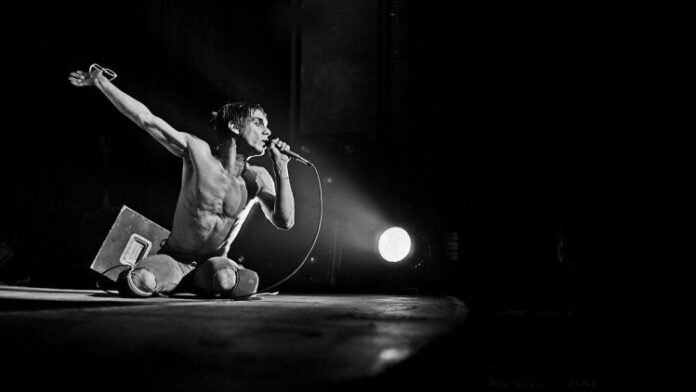
The Shirtless Shaman of Self-Destruction
Iggy Pop didn’t just break the rules he urinated on them, rolled in glass and then snorted the ashes for good measure. With The Stooges, he helped invent punk before anyone knew what to call it. And when he took the stage, it was like watching a caveman discover electricity chaotic, dangerous and completely mesmerising.
I remember watching grainy footage of Iggy in the ’70s, shirtless (obviously), bleeding (probably), and climbing over the crowd like a feral cat on a bad trip. He wasn’t performing at the audience — he was dissolving into them. This was communion through chaos, like he was trying to tear down the boundary between artist and audience with sheer force of will.
He wasn’t just unpredictable, he was inevitable. The kind of presence that made you think, “Someone should probably call an ambulance,” and yet you couldn’t look away. He bled, he howled, he flailed like a man who’d never heard of choreography and had a personal vendetta against gravity. And the music all jagged riffs and nihilistic howls only fuelled the fire.
But beneath the blood and carnage was intelligence. Iggy was no idiot, he was a provocateur with purpose. A guy who knew exactly how to push a performance to its breaking point and make you question what a concert could even be.
Iggy Pop was performance art with a pulse. The kind of chaos you can’t rehearse, only survive. And if you were lucky enough to be in the room, you didn’t just see a gig, you witnessed a controlled demolition in human form.
3. David Bowie
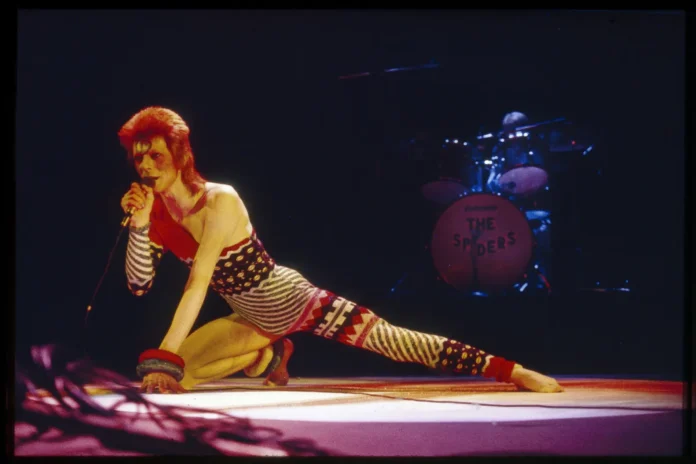
The Chameleon King of Glam and Beyond
David Bowie fronted entire universes. The man was a walking, talking kaleidoscope of style, sound and sheer enigmatic charisma, forever shape-shifting in a way that made the rest of us feel like we’d stumbled into a David Lynch fever dream wearing last season’s jeans.
I remember the first time I properly got Bowie. It was on a cracked radio in my bedroom when “Life on Mars?” came on. The piano, the surreal lyrics, that voice, part croon, part alien transmission. It wasn’t just a song, it was a portal. Bowie had this insane ability to make the weird not just palatable but utterly magnetic. You couldn’t look away because you weren’t just watching a performance you were witnessing a transformation.
From Ziggy Stardust’s androgynous alien rockstar to the sleek, haunting Thin White Duke, Bowie redefined what it meant to be a frontman by obliterating the idea of a fixed identity. He wasn’t just performing songs; he was creating characters and worlds, dragging audiences along on a theatrical trip that often felt like a psychedelic dream with a hint of noir. His concerts were less gigs and more immersive experiences where reality got bent and glamoured into something utterly new.
But Bowie’s power wasn’t just his chameleonic image, it was the voice and presence underneath. He could sound vulnerable, sinister, playful, or downright apocalyptic with a flick of his vocal cords. And his stage presence? Electric and unsettling. Bowie owned his otherness and made it a weapon of mass attraction. You felt like he was speaking directly to the freak in all of us, inviting you to come out of the shadows and dance in the weird.
Iggy Pop might have smashed himself into the crowd, but Bowie was the cool, calculating force pulling the strings, the puppet master of glam who also played the fool, the king and the outcast all at once. Bowie proved frontmanship wasn’t about the loudest voice or the wildest moves sometimes, it was about embodying the future in the present.
In every sense, Bowie was the frontman’s frontman: endlessly inventive, wildly theatrical and utterly uncompromising. He showed us that to lead a band was to lead a revolution of identity, style and sound. And for that, he remains not just a legend, but a blueprint for anyone daring enough to take a mic and claim their weirdness as their crown.
2. Freddie Mercury (Queen)
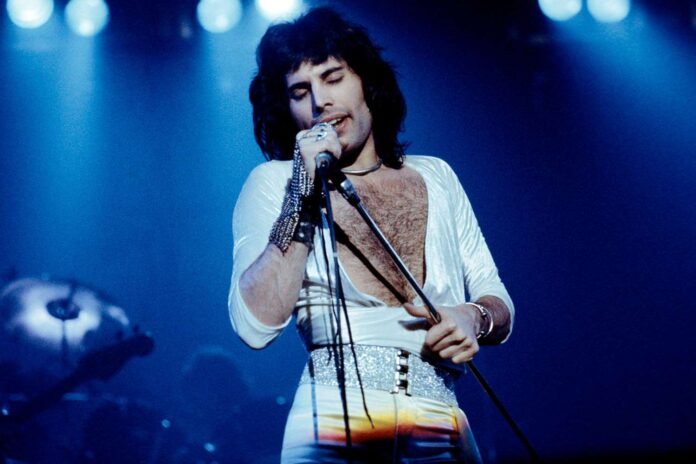
The Operatic Ringmaster of Stadium Rock
Freddie Mercury didn’t just walk onto a stage, he materialised, like a glittery poltergeist with a five-octave range. He was part Dionysus, part Liberace, part lion tamer. Whether wearing a diamond unitard, military jacket, or nothing but charisma and a suspiciously tight pair of white jeans, Freddie wasn’t just performing he was orchestrating a spiritual event disguised as a rock concert.
I remember the first time I watched Queen’s Live Aid set. My mate had insisted it was “the greatest 20 minutes in music history,” which, to a teenager raised on LimeWire and nu-metal, sounded like hyperbole laced with midlife crisis. But bloody hell, he was right. Freddie walks on and within seconds, has every wrist in Wembley doing the world’s most synchronised clap-along to “Radio Ga Ga.” It was less a performance and more an act of mass hypnosis.
It wasn’t just the voice, although that could knock satellites out of orbit. It was the presence. The way he could command a stadium and make it feel intimate. He’d look at the camera like he was serenading you, specifically, as if the 80,000 others were just extras in your personal Queen biopic. He didn’t sing to the audience, he sang with them, over them, through them.
And he was weird in all the right ways. This was a man who once threw a birthday party featuring dwarves walking around with trays of cocaine on their heads (allegedly). He could switch from crooning like a broken-hearted opera star to barking out “We Will Rock You” like a foot-stomping gladiator. And he never took it too seriously, always that knowing wink, the self-aware flamboyance that said yes, I’m ridiculous, and so are you, so let’s bloody enjoy ourselves.
Freddie made it cool to be theatrical again. While punk was busy spitting on everything and metal was busy growling at demons, Queen brought bombast back with Freddie at the helm, caped, moustachioed, and often shirtless.
Even his vulnerability was mythic. He kept his HIV diagnosis private until the day before he died, going out on his own terms like some tragic Shakespearean hero, except with better hair and more eyeliner. And yet, even in those later years, that fire never dimmed. Watch the video for “These Are the Days of Our Lives” and try not to break inside when he turns to the camera and whispers, “I still love you.” It’s not just a goodbye. It’s a mic drop from the heavens.
Freddie Mercury wasn’t just a frontman. He was the frontman. The gold standard. The operatic overlord of rock. And if you’ve never felt chills watching him shout “AY-OH!” to an arena and get it shouted back in perfect pitch, you’ve never truly lived.
1. Mick Jagger (The Rolling Stones)
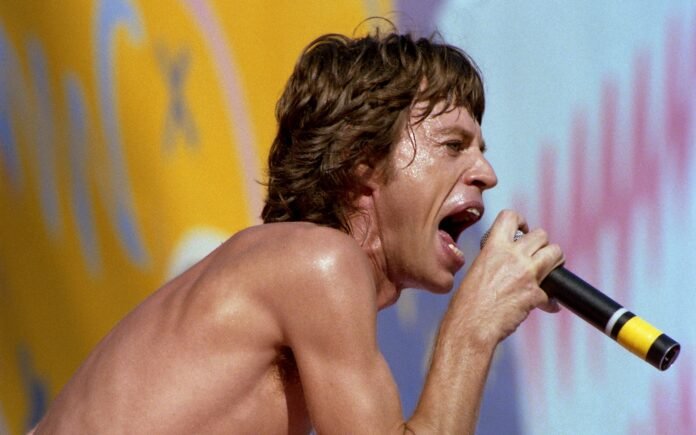
The Swaggering Godfather of Rock’n’Roll
Mick Jagger is the living, breathing embodiment of rock ’n’ roll’s eternal sneer. From the moment he sashayed onto the stage in the early ’60s, it was clear he wasn’t there to politely sing songs. No, Mick was there to own every inch of the stage, to make your mum clutch her pearls and your dad wish he had hair like that. He’s a man who turns a raised eyebrow into a global headline and a hip swivel into a seismic event.
I remember watching old clips where he’d throw shapes like a man possessed by the devil’s own rhythm section, each movement so precise yet so loose it seemed simultaneously rehearsed and spontaneous. There’s an almost supernatural confidence about Jagger, like he’s always three beats ahead of the rest of us, knowing exactly when to throw in a grin, a sneer, or a glance that says, “Yeah, I know you want me, but good luck getting me.”
Sure, he’s got the voice of a man who’s smoked, shouted and scandalised his way through decades it’s ragged, raw and sometimes sounds like he’s gargling gravel. But that’s the point. Mick’s voice is a weapon, a charm, a challenge. It doesn’t just deliver the lyrics; it drags them out of you, kicking and screaming. And his stage presence? It’s a cocktail of primal energy, mischievous grin and a touch of theatrical lunacy.
Watching Mick front The Rolling Stones is like watching a masterclass in rock charisma. His ability to command an arena filled with tens of thousands or a tiny, sweaty club is almost mythical. The man moves like he’s perpetually on the brink of breaking into a run, a dance, or a fight and all the while he’s somehow inviting you to join in the madness.
Offstage, he’s a relentless self-reinvention machine, mixing decadence and art with a cheeky wink to the absurd. Mick Jagger didn’t just create a band he crafted a persona that embodies rock’s reckless spirit and relentless drive. He’s the guy who proved that frontmen aren’t just singers, they’re ringmasters of chaos, poets of the street and occasionally, downright troublemakers.
In short, Mick Jagger isn’t just a frontman. He’s rock ’n’ roll’s original pied piper, forever leading us into a world of swagger, sweat and unforgettable moments. And as long as he keeps moving those hips, the show will go on.



